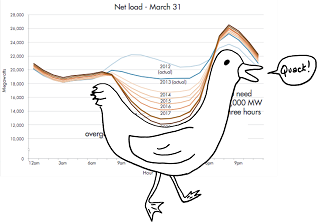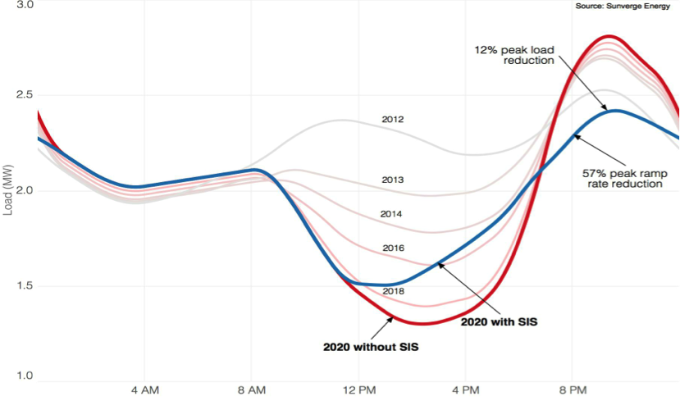Demand for Energy Storage in a Changing World

The steepening neck of the duck in the now-famous “duck curve” (pictured above and below) is one more factor making life tough for the utilities, as distributed solar energy has greatly accentuated the difference between peak and off-peak requirements by reducing the amount of load during the day that must come from the power companies. Making matters worse, solar energy sold back to the grid creates voltage instabilities that the utilities have to correct by employing expensive equipment.

The world is very close to realizing how valuable energy storage is—not only for its ability to capture electric energy that would otherwise be wasted, but for its ability to provide ancillary services, like the regulation of voltage and the AC wave form, problems that are becoming thornier as our grids grow larger and more complex. Also, recent legislation in the U.S. is paving a path by which providers of these services can be adequately compensated.
The fossil fuel industry, in its efforts to suppress and delay the migration to clean energy, understands that the addition of storage is a huge enabler for renewables, and has historically done everything in its power to keep it from happening—largely by confusing those trying to make sense of it. In legal hearings on the matter, they insist that storage providers answer the question: Is storage a generation asset or a transmission asset? When those testifying point out that the question has no meaning, they’re accused of being “disrespectful.” Of course, those posing the question are well aware that there is no good answer; it’s reminiscent of Salem in 1692 (Tell us: Are you a witch, or are you a sorceress?)
While it’s true that we have previously thought of generation and transmission as distinct elements of our grid, this idea needs to be discarded in the context of energy in the 21st Century. Fortunately, the good guys are winning this debate; we appear to have reached the point where our judges are losing their patience for and tolerance of stonewalling in this arena.
